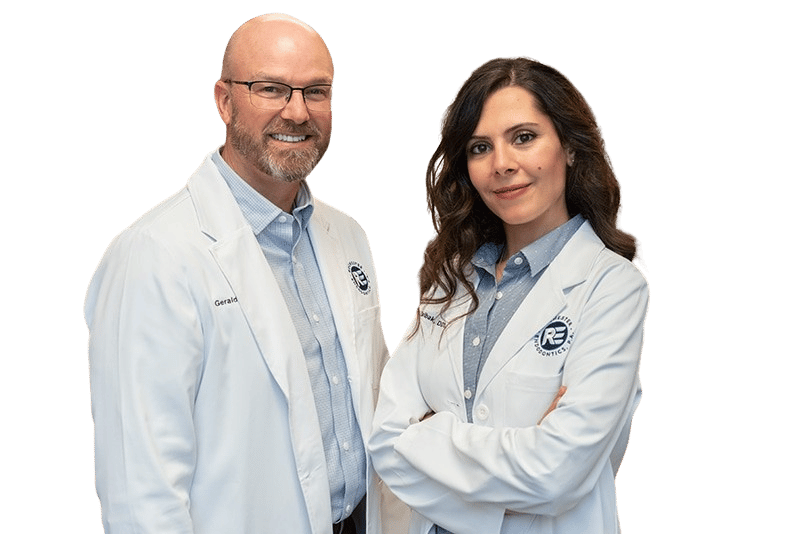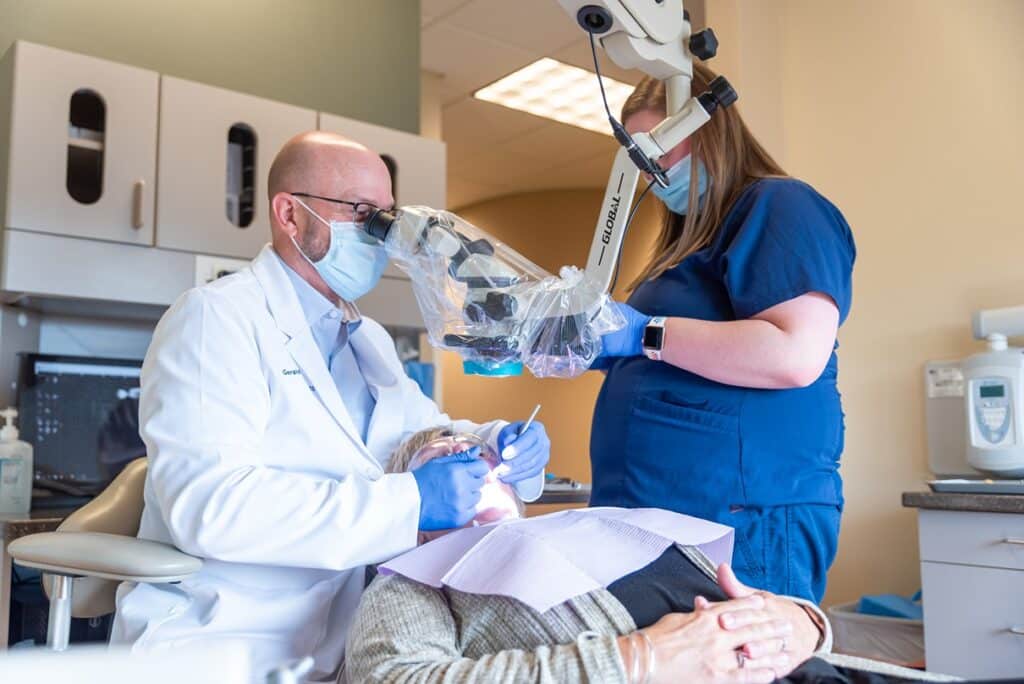Patient Resources
FAQs About Root Canals in Rochester, MN
Root canals are one of our specialties here but there is a lot of confusion and fear around this common procedure. We have put together a comprehensive FAQ page to address common questions about root canals. Our expert endodontists are dedicated to providing comprehensive answers to ensure you’re well-informed about this tooth-saving dental procedure. If you have further questions or wish to schedule a consultation, please contact us at (507) 629-1591

What is a Root Canal?
A root canal is a dental procedure designed to treat infections or damage within the tooth’s pulp chamber and root canals. The pulp, which contains nerves, blood vessels, and connective tissue, can become infected due to deep decay, cracks, or trauma. During the procedure, the infected or inflamed pulp is carefully removed, and the inside of the tooth is thoroughly cleaned, disinfected, and sealed to prevent further infection or damage. Root canals are crucial for preserving the natural tooth and preventing the spread of infection to surrounding tissues.
When is a Root Canal Necessary?
Root canals become necessary when the pulp inside a tooth becomes infected or inflamed. This can occur due to deep decay, cracks, chips, or trauma to the tooth.
Common symptoms indicating the need for a root canal include severe toothache, sensitivity to hot or cold, swelling, or a pimple on the gum near the affected tooth. Ignoring these symptoms can lead to further complications, such as abscess formation or tooth loss, emphasizing the importance of timely intervention with a root canal procedure.
How Long Does The Procedure Take?
The duration of a root canal procedure varies depending on several factors, including the tooth’s location, complexity, and the severity of the infection. On average, it can be completed in one to two visits, each lasting approximately 60 to 90 minutes. During the procedure, your Rochester endodontist meticulously removes the infected pulp, cleans and shapes the root canals, and fills them with a biocompatible material to seal the tooth, restoring its function and integrity. Despite the complex nature of the procedure, patients can typically resume their normal activities shortly afterward.
What are the Benefits of Choosing a Specialist Endodontist for a Root Canal?
Opting for a specialist endodontist for a root canal in Rochester, MN offers several distinct advantages. Endodontists are dental specialists who undergo additional years of advanced training beyond dental school, focusing exclusively on diagnosing and treating issues related to the tooth’s pulp and surrounding tissues. Their specialized training and expertise enable them to accurately diagnose complex dental problems and provide specialized treatment, including root canal therapy, with precision and efficiency.
Additionally, endodontists utilize state-of-the-art technology and advanced techniques to ensure optimal outcomes and patient comfort, making them the preferred choice for root canal procedures.
Will it be Painful?
Contrary to common misconceptions, root canals are typically not painful, thanks to modern advancements in anesthesia and sedation techniques. Before the procedure begins, the endodontist administers local anesthesia to numb the tooth and surrounding tissues, ensuring the patient remains comfortable throughout the treatment.
While some patients may experience mild discomfort or soreness following the procedure, over-the-counter pain medication can effectively alleviate any post-operative symptoms. Overall, root canals are essential for relieving the intense pain caused by infected tooth pulp and restoring oral health and function.
Can Teeth Sometimes Need a Second Root Canal?
Yes, there are instances where a tooth may require a second root canal procedure, known as retreatment. Despite the initial root canal treatment, certain factors may contribute to treatment failure or the recurrence of infection within the tooth. These factors can include incomplete removal of infected tissue, untreated additional canals, or the presence of new infection or decay. In such cases, retreatment by a specialist endodontist may be necessary to thoroughly clean and disinfect the tooth’s root canal system, effectively addressing any lingering issues and preserving the tooth whenever possible.

What are the Alternative Options?
While root canal therapy is often the most effective way to save a severely infected or damaged tooth, alternative treatment options exist. One alternative is tooth extraction, which involves removing the affected tooth entirely. However, extraction may lead to other complications, such as neighboring teeth shifting out of alignment or difficulty chewing. Whenever possible, preserving the natural tooth through root canal therapy is preferable, as it maintains the integrity of the dental arch and prevents the need for additional dental procedures, such as dental implants or bridges.
Can Root Canals Fail?
While root canal treatment has a high success rate, there is a slight possibility of treatment failure due to various factors. These factors may include incomplete removal of infected tissue, untreated additional canals, or the presence of new infection or decay.
Additionally, complications such as instrument fractures or canal obstructions can contribute to treatment failure. In such cases, patients may experience persistent pain, swelling, or other symptoms indicating the need for further intervention.
Fortunately, specialist endodontists possess the expertise and advanced techniques to address these challenges and effectively manage cases of root canal failure through retreatment or endodontic surgery.
I Have a Crown. Can I Get a Root Canal?
Yes, root canal therapy can be performed on a tooth that has been previously restored with a crown. In some cases, the crown may need to be removed temporarily to access the underlying tooth structure for treatment. Once the root canal procedure is completed, the endodontist carefully cleans and disinfects the tooth’s interior before sealing it to prevent further infection. Afterward, the crown is either re-cemented onto the tooth or replaced with a new crown to restore its appearance and function. Performing root canal therapy on a crowned tooth allows for the preservation of the natural tooth structure and avoids the need for extraction and replacement with a dental implant or bridge.
Can I Do Anything To Prevent Root Canals?
While not all instances of tooth decay or damage can be prevented, you can take steps to minimize the risk of needing a root canal. Maintaining good oral hygiene practices, such as brushing your teeth twice a day with fluoride toothpaste, flossing daily, and attending regular dental check-ups, can help prevent the buildup of plaque and tartar, reducing the likelihood of tooth decay and gum disease.
Additionally, avoiding harmful habits such as chewing on hard objects or using your teeth as tools can help prevent dental trauma that may necessitate root canal therapy. Finally, wearing a mouthguard during sports or activities that pose a risk of dental injury can protect your teeth from trauma and fractures, further reducing the likelihood of needing a root canal.
What is a Molar Root Canal?
A molar root canal refers to a specific type of root canal procedure performed on a molar tooth. Molars are large, multi-rooted teeth located at the back of the mouth, used primarily for grinding and chewing food. Due to their size and complex root structure, molars are more susceptible to decay, cracks, and infection, often necessitating root canal therapy. During a molar root canal, your endodontist in Rochester, MN, carefully accesses the interior of the tooth to remove the infected or damaged pulp tissue from each of the tooth’s roots.
This process may require specialized instruments and techniques to effectively clean and shape the intricate root canal system within the molar. Once the infected pulp is removed, the canals are thoroughly disinfected, filled with a biocompatible material, and sealed to prevent further infection. Molar root canal procedures may be more challenging and time-consuming compared to root canals performed on other teeth due to the molar’s anatomy, but they are crucial for preserving the tooth and restoring its function and health.
Can a Cracked Tooth Cause Infection?
Yes, a cracked tooth can lead to infection if left untreated. When a tooth becomes cracked, it creates a pathway for bacteria to enter the inner layers of the tooth, including the pulp chamber where the nerves and blood vessels are located. Once bacteria infiltrate the pulp, they can cause inflammation and infection, resulting in symptoms such as pain, sensitivity to temperature, swelling, or even the formation of an abscess.
It’s essential to address a cracked tooth promptly to prevent further damage and potential infection. Depending on the severity and location of the crack, treatment options may include dental bonding, a crown, or in more severe cases, root canal therapy to remove the infected pulp and restore the tooth’s health. Regular dental check-ups are essential for identifying and treating cracked teeth early, minimizing the risk of complications such as infection.
Experience Expert-Led Root Canals at Rochester Endodontics
We hope these detailed answers have provided valuable insights into the intricacies of root canal therapy and its importance in maintaining optimal oral health. If you have any further questions or would like to schedule a consultation for a root canal in Rochester, MN, please do not hesitate to contact us.
We’re here to help!
If you have any questions or concerns, please do not hesitate to reach out to us.
Our friendly team is happy to help you in any way we can.
